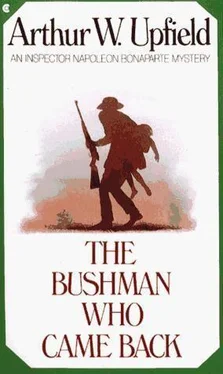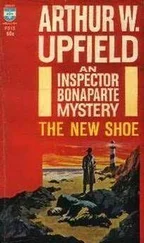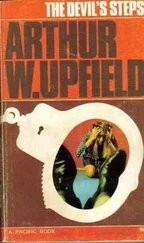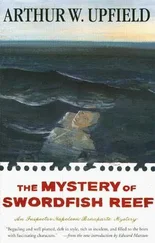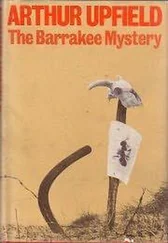Arthur Upfield - The bushman who came back
Здесь есть возможность читать онлайн «Arthur Upfield - The bushman who came back» весь текст электронной книги совершенно бесплатно (целиком полную версию без сокращений). В некоторых случаях можно слушать аудио, скачать через торрент в формате fb2 и присутствует краткое содержание. Жанр: Классический детектив, на английском языке. Описание произведения, (предисловие) а так же отзывы посетителей доступны на портале библиотеки ЛибКат.
- Название:The bushman who came back
- Автор:
- Жанр:
- Год:неизвестен
- ISBN:нет данных
- Рейтинг книги:4 / 5. Голосов: 1
-
Избранное:Добавить в избранное
- Отзывы:
-
Ваша оценка:
- 80
- 1
- 2
- 3
- 4
- 5
The bushman who came back: краткое содержание, описание и аннотация
Предлагаем к чтению аннотацию, описание, краткое содержание или предисловие (зависит от того, что написал сам автор книги «The bushman who came back»). Если вы не нашли необходимую информацию о книге — напишите в комментариях, мы постараемся отыскать её.
The bushman who came back — читать онлайн бесплатно полную книгу (весь текст) целиком
Ниже представлен текст книги, разбитый по страницам. Система сохранения места последней прочитанной страницы, позволяет с удобством читать онлайн бесплатно книгу «The bushman who came back», без необходимости каждый раз заново искать на чём Вы остановились. Поставьте закладку, и сможете в любой момент перейти на страницу, на которой закончили чтение.
Интервал:
Закладка:
The dijeridoo was as thick as a man’s leg, and so long that the end rested on a sheet of bark beyond Canute’s outstretched feet. The mouth end was but little smaller than the far opening, and from it issued sounds, which, to ears accustomed to white man’s music, would be meaningless.
Canute was telling a story which was first told when Lake Eyre was part of a great sea.
There was a woman who lived in a cave on a hill, a wise woman who could see far and who heard the birds talking. With her was her son, a stripling, a beautiful youth. Now the day came when a party of the woman’s people were to leave for a distant country to trade magic churinga stones for spear shafts. These men came to the woman and asked that her son might go with them, and so begin to become a man.
The woman consented, and the youth departed with the traders, and they were away for a long time, until the woman, anxiously watching from her cave, saw them come over a ridge far away. Slowly and often she counted them, and the number was short by one.
The traders said that a great man-bird had swooped down upon them and taken the youth into the sky and given him to its fledglings in a nest on a pile of stones. They hid themselves in hollow trees and dared not come out till night came.
So, as custom dictated, all the men cut into themselves the mourning marks, and all the women cut their breasts and lamented for five days. On the sixth day the woman called the traders to sit before her cave. She spoke soft words to them, and gave them honey ants on palm leaves to eat, and sweet water in little gourds to drink. And one by one they fell over, and told her they had killed the beautiful youth because all the maidens rejoiced over him and would not look upon them.
They died, and the woman made a big fire and burned them, and she raised her arms to lift the sky high and permit a tall willi-willi to sweep over the world and kick the bones to dust.
Was it Canute telling this story? How can a story be told unless with words? You may say that music can tell a story for those with ears to hear, but you would be the last to say that Canute was producing music. Shall we compromise, agree that Canute was passing on the oldold stories for those with ears to hear and minds to interpret them? For from that dijeridoo issued no tune, no rhythm, no note to be even imagined as musical.
Detective Inspector Napoleon Bonaparte listened raptly to the story of the woman and the beautiful youth. None was aware that he stood behind one of the white pillars.
A lean old man sat beside Canute. His arms rested on his knees, his face resting on the crossed arms. Bony saw Sarah, who was nursing a naked baby. Her face was lifted as though pictures were strung between two of the white gums. Meena was there, wearing a blue skirt, her body naked above the waist, the soft firelight shimmering like golden dew on her untapped breasts. Like many of the others, she was gazing into the heart of the fire. The young man Bony knew as Charlie was there too, watching Meena.
Bony had listened to more than the outline of the story. He had heard the tramp of the willi-willi coming across the world, the clash and crash of pounded bones kicked to dust. He had seen the cave, the very stones of its entrance, the woman tall and graceful, and the stripling son as he walked down the hill to pass into the keeping of his murderers. Bony had felt the wind, heard it in the trees and in the grass. He had watched the lie swoop down from the sky, the lie which was a giant bird with a man’s head. He had shrunk away from the evil of the bird’s face, and he had thrilled as he watched the agony of the poisoned liars.
He was but half way from the white man toward these descendants of the ancient inhabitants. He heard, and saw the pictures, because he knew the story. Thus he could follow and interpret the sounds issuing from the dijeridoo. But when Canute told another story of which he was ignorant, the sounds were of no help, told him no story, but did create pictures of flat water, waving tobacco bush, wind stirring sand grains. The story was told and another begun, and he received pictures sometimes blurred, sometimes sharply clear, in rapid alternation.
He fancied, for it could have been nothing more than fancy, that he saw a white man heavily burdened. The load he carried was larger than himself. Later, he saw a white man crawling on hands and knees. The noises from the hollow instrument filed past his ears, each one isolated. It was as though one laughed as it passed, another cried, another whispered something he couldn’t hear. He saw a man, a slim man. His hair was black and straight. His face was pale. He was groping to identify this man and did identify him when he was struggling to look, as through fog, upon a child whose skin was white, and then was black, and in whose arms snuggled a spirit baby created by mirage water.
Another picture commanded his mind, stayed there for a fraction of a second, fled into the darkness behind his closed eyes. The flash picture was of a ghost, a woman running from him, and on her back a question mark.
And then he was following another remembered story, this time of two young aborigines who robbed the nest of an eagle and were captured by a dingo with an eagle’s head, and who made them carry him because he had a burr in his foot.
The last note of a musical instrument is emphasized by the vacuum of silence, like the bottom of a well receiving a stone. When the sounds of the dijeridoo ceased, there was no silence, the minds of those listening continuing to hear what the ears no longer registered.
Bony could not be sure when the dijeridoo stopped, nor when he realized that it had done. On opening his eyes, he saw that Canute was rolling a cigarette, the dijeridoo was lying on the ground at his side, and the audience was still captive. He noted, too, that Meena was the first to be conscious of her surroundings, and immediately after her, a woman and a young man. Meena rose and soundlessly departed to the deeper shadow of a humpy before the others broke from the spell, and those closest in blood to the pure aborigine were the last to be released by Canute’s ‘art’.
Stepping round the trunk of the tree, Bony leaned against it and brought fingers to work making a cigarette. Someone tossed wood into Ganba’s red eye, and the initiated men moved nearer to Canute and his chief henchman, Murtee. Then Bony struck a match and applied the flame to his cigarette.
Those about the fire turned at the sound, save the Medicine Man and the Chief. Bony went forward, ebony images now frozen, waiting inscrutably. He passed round a right flank of them, and seated himself cross-legged when the Elders were directly to his front. Dark eyes reflected the firelight, not unlike black opals.
Bony smoked his cigarette, and not a word was said, nor a gesture made. It was as though they occupied one side of a gulf and could be reached only by him who had wings to fly. Slowly, Bony made another cigarette, and casually smoked that to the last half-inch, and still no word was spoken.
All of them, and there were seventeen, were in excellent physical condition, several being positively fat. Canute wore good cloth trousers and no shirt. Murtee wore a blue silk shirt, trousers and tennis shoes. Two were smoking good-quality pipes. Knowing he would have to attempt the flight, Bony spoke.
“You are Orrabunna men. I am Worcair man.”
He knew his assessment of the degree of their nearness to the whites was accurate when Canute said:
“My mother was emu totem and my father was jerboa. I am emu man.”
“My mother! I don’t know her totem. My father was a white man. My other father is my brother and my son, my uncle and my grandfather. His name was Illawallie. He was head man of the Worcair. The marks of the Worcair are on me.”
Читать дальшеИнтервал:
Закладка:
Похожие книги на «The bushman who came back»
Представляем Вашему вниманию похожие книги на «The bushman who came back» списком для выбора. Мы отобрали схожую по названию и смыслу литературу в надежде предоставить читателям больше вариантов отыскать новые, интересные, ещё непрочитанные произведения.
Обсуждение, отзывы о книге «The bushman who came back» и просто собственные мнения читателей. Оставьте ваши комментарии, напишите, что Вы думаете о произведении, его смысле или главных героях. Укажите что конкретно понравилось, а что нет, и почему Вы так считаете.
